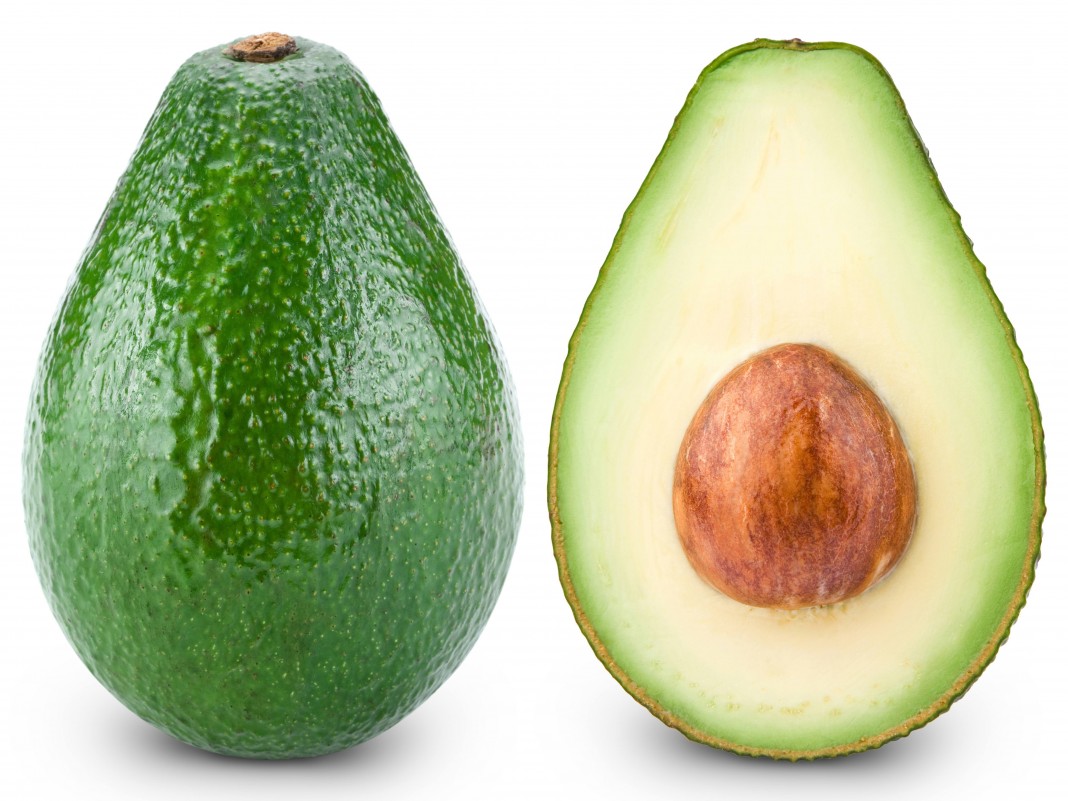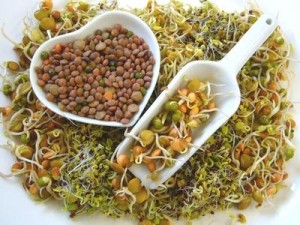Your physical health is a direct likeness of the food that enters in your body, and how you live your life in general.
Store-bought food may be convenient, but cooking from scratch using fresh unprocessed ingredients is a must if you want to improve your health!
Once you start eating non-adulterated foods—foods that are as close to their natural state as possible—then basically everything you eat is a “superfood”. You need nutrients—all of them—and nutrients are found in abundance in fresh, raw foods. Still, lists of specific items can be helpful to take you back on track.
Most nutritionists agree that the following 10 foods are the essential items for your healthy cooking and snacking:
1. Sunflower and other sprouted seeds
One of the easiest and most efficient ways to optimize your daily nutrition is to add sprouted seeds to your vegetable juices and/or salads.
When sprouted, the protein, vitamin, and mineral content of sunflower seeds “rocket” your energy, and will typically provide you with 30 times the nutrient content of organic vegetables! Sprouts in general also contain valuable enzymes—up to 100 times more enzymes than raw fruits and vegetables—that allow your body to absorb and use the nutrients of other foods you eat.
Sprouts are the ultimate locally-grown food, and can easily be grown in your own kitchen, even if you’re tight on space. And since they’re very inexpensive, cost is no excuse for avoiding them!
2. Organic pastured eggs
 Proteins are essential for building, maintenance and repair of your body tissues, including your skin, internal organs and muscles. Proteins are also major components of your immune system and hormones.
Proteins are essential for building, maintenance and repair of your body tissues, including your skin, internal organs and muscles. Proteins are also major components of your immune system and hormones.
While proteins are found in many types of food, only foods from animal sources, such as meat and eggs, contain “complete proteins”, meaning that they contain all of the essential amino acids. Eggs also contain lutein and zeaxanthin for good eye health, choline for your brain, nervous and cardiovascular systems, and naturally occurring vitamin B12.
Eggs are considered powerhouses of healthy nutrition, on condition that they are obtained from chickens raised on organic food. The nutritional differences between true free-ranging chicken eggs and commercially farmed eggs are a result of the different diets eaten by the two groups of chickens.
You can tell the eggs are free range or pastured by the color of the egg yolk. Foraged hens produce eggs with bright orange yolks. Dull, pale yellow yolks are a sure sign you’re getting eggs from caged hens that are not allowed to forage for their natural diet. Your best source of fresh eggs is a local farmer that allows his hens to forage freely outdoors.
3. Butter
 Butter, when made from grass-fed cows, is a rich in a substance called conjugated linoleic acid (CLA). CLA is not only known to help fight cancer and diabetes, but it may even help you lose weight.
Butter, when made from grass-fed cows, is a rich in a substance called conjugated linoleic acid (CLA). CLA is not only known to help fight cancer and diabetes, but it may even help you lose weight.
Butter is a rich source of easily absorbed vitamin A (needed for a wide range of functions, from maintaining good vision to keeping the endocrine system in top shape) and all the other fat-soluble vitamins (D, E, and K2), which are often lacking in the modern industrial diet. Butter is rich in important trace minerals, including manganese, chromium, zinc, copper, and selenium (a powerful antioxidant).
4. Fermented vegetables
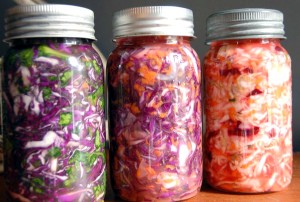 Human gastrointestinal tract (GI) houses some 100 trillion bacteria. These bacteria actually outnumber your cells in the ratio 10 to 1. When your GI tract is not working well, a wide range of health problems can appear, including allergies and autoimmune diseases. If you suffer from any major illness, it’s imperative to “heal and seal” your gut in order to fully recuperate. Balancing the menagerie of “microflora” that occupies your GI tract is a key part of maintaining a robust immune system!
Human gastrointestinal tract (GI) houses some 100 trillion bacteria. These bacteria actually outnumber your cells in the ratio 10 to 1. When your GI tract is not working well, a wide range of health problems can appear, including allergies and autoimmune diseases. If you suffer from any major illness, it’s imperative to “heal and seal” your gut in order to fully recuperate. Balancing the menagerie of “microflora” that occupies your GI tract is a key part of maintaining a robust immune system!
So, in order to maintain a healthy gut, fermented food is a necessity. Just one quarter to one half cup of it, eaten with 1 to 3 meals per day, can have a dramatically beneficial impact on your health. Yogurt and kefir are two examples, but there are many others. Ideally, you’ll need to include a variety of cultured and fermented vegetables in your diet, as each provides different types of beneficial bacteria.
5. Avocado
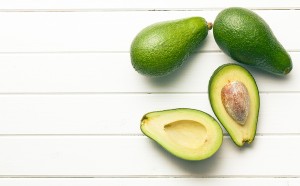 The avocado, which is actually classified as a fruit, is low in fructose and rich in healthy monounsaturated fat (which is easily burned for energy). Research has confirmed the avocado’s ability to benefit vascular function and heart health.
The avocado, which is actually classified as a fruit, is low in fructose and rich in healthy monounsaturated fat (which is easily burned for energy). Research has confirmed the avocado’s ability to benefit vascular function and heart health.
It is also very high in potassium (more than twice the amount found in a banana) and will help balance your vitally important potassium to sodium ratio. The avocados also provides close to 20 essential health-boosting nutrients, including fiber, vitamin E, B-vitamins, and folic acid. Besides eating it raw, you can use the avocado as fat substitute in recipes calling for butter or other oils. Another boon of avocados—they’re one of the safest fruits you can buy conventionally-grown, so you don’t need to spend more for organic ones. Their thick skin protects the inner fruit from pesticides.
6. Macadamia nuts and pecans
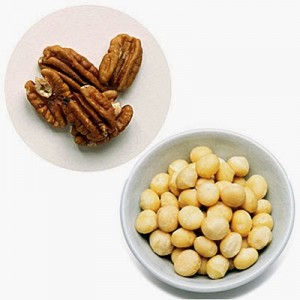 Mounting research suggests that nuts actually help you live longer, and help you lose weight. This isn’t so surprising considering the fact that tree nuts are high in healthy fats that, contrary to popular belief, your body needs for optimal function. Most nuts’ nutritional makeup closely resemble what I consider to be an ideal ratio of the basic building blocks—fat making up the greatest amount of your daily calories, followed by a moderate amount of high-quality protein and a low amount of non-vegetable carbs.
Mounting research suggests that nuts actually help you live longer, and help you lose weight. This isn’t so surprising considering the fact that tree nuts are high in healthy fats that, contrary to popular belief, your body needs for optimal function. Most nuts’ nutritional makeup closely resemble what I consider to be an ideal ratio of the basic building blocks—fat making up the greatest amount of your daily calories, followed by a moderate amount of high-quality protein and a low amount of non-vegetable carbs.
The main fatty acid in macadamia nuts is the monounsaturated fat oleic acid (about 60%). This is about the level found in olives, which are well-known for their health benefits.
7. Organic coconut oil
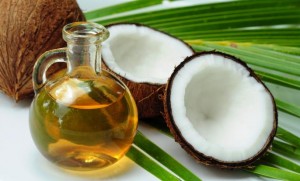 Besides being excellent for your thyroid and your metabolism, unrefined, unbleached coconut oil is rich in lauric acid, which converts in your body to monolaurin, a monoglyceride capable of destroying lipid-coated viruses such as HIV and herpes, influenza, measles, gram-negative bacteria, and protozoa such as Giardia lamblia.
Besides being excellent for your thyroid and your metabolism, unrefined, unbleached coconut oil is rich in lauric acid, which converts in your body to monolaurin, a monoglyceride capable of destroying lipid-coated viruses such as HIV and herpes, influenza, measles, gram-negative bacteria, and protozoa such as Giardia lamblia.
Its medium chain fatty acids (MCTs) also bring a number of health benefits, including raising your body’s metabolism and fighting off pathogens. Additionally, a very exciting and recent discovery is that coconut oil may serve as a natural treatment for Alzheimer’s disease, as MCTs are also a primary source of ketone bodies, which act as an alternate source of brain fuel that can help prevent the brain atrophy associated with dementia.
This oil is easy on your digestive system and does not produce an insulin spike in your bloodstream, so for a quick energy boost, you could simply eat a spoonful of coconut oil, or add it to your food.
8. Fresh herbs
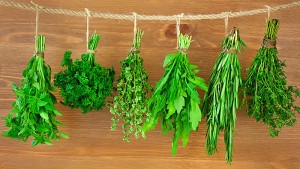 Herbs are not only great in meals for spice and added flavor, but are the key to the nutritional density in the foods you eat. As just one example, plain black pepper actually increases the bioavailability of just about all other foods — herbs and other compounds! Herbs can protect you against diseases, clear toxins from your body, and provide you with vitamins and minerals. Every time you flavor your meals with herbs or spices you are literally “upgrading” your food without adding a single calorie.
Herbs are not only great in meals for spice and added flavor, but are the key to the nutritional density in the foods you eat. As just one example, plain black pepper actually increases the bioavailability of just about all other foods — herbs and other compounds! Herbs can protect you against diseases, clear toxins from your body, and provide you with vitamins and minerals. Every time you flavor your meals with herbs or spices you are literally “upgrading” your food without adding a single calorie.
9. Raw garlic
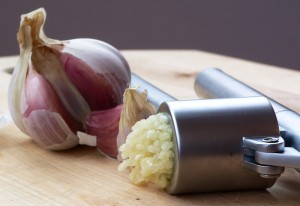 Raw garlic is a food that should be on your menu daily. It boosts your body’s natural abilities to protect you from hypertension and osteoporosis, and research is mounting that it decreases your risk from various forms of cancer. It is a potent antimicrobial as well, working as a natural antibiotic, antifungal, antiviral, and antiparasitic agent. Garlic must be fresh to give you optimal health benefits, though. The fresh clove must be crushed or chopped in order to stimulate the release of an enzyme called alliinase, which in turn catalyzes the formation of allicin.
Raw garlic is a food that should be on your menu daily. It boosts your body’s natural abilities to protect you from hypertension and osteoporosis, and research is mounting that it decreases your risk from various forms of cancer. It is a potent antimicrobial as well, working as a natural antibiotic, antifungal, antiviral, and antiparasitic agent. Garlic must be fresh to give you optimal health benefits, though. The fresh clove must be crushed or chopped in order to stimulate the release of an enzyme called alliinase, which in turn catalyzes the formation of allicin.
Research has revealed that as allicin digests in your body, it produces sulfenic acid, a compound that reacts with dangerous free radicals faster than any other known compound. To activate garlic’s medicinal properties, compress a fresh clove with a spoon prior to swallowing it, or put it through your juicer to add to your vegetable juice. A single medium-sized clove or two is usually sufficient, and is well-tolerated by most people. The active ingredient, allicin, is destroyed within one hour of smashing the garlic, so garlic pills are virtually worthless. You also won’t reap all the health benefits garlic has to offer if you use jarred, powdered or dried versions.
10. Homemade broth
 Homemade bone broth is excellent for speeding healing and recuperation from illness, as it helps “heal and seal” your stomach, the importance of which was discussed earlier. It contains healthy fat, of course, but also important minerals like calcium, magnesium, phosphorus, silicon, sulfur, and trace minerals, as well as the broken down material from cartilage and tendons—including chondroitin sulphates and glucosamine.
Homemade bone broth is excellent for speeding healing and recuperation from illness, as it helps “heal and seal” your stomach, the importance of which was discussed earlier. It contains healthy fat, of course, but also important minerals like calcium, magnesium, phosphorus, silicon, sulfur, and trace minerals, as well as the broken down material from cartilage and tendons—including chondroitin sulphates and glucosamine.


